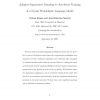Free Online Productivity Tools
i2Speak
i2Symbol
i2OCR
iTex2Img
iWeb2Print
iWeb2Shot
i2Type
iPdf2Split
iPdf2Merge
i2Bopomofo
i2Arabic
i2Style
i2Image
i2PDF
iLatex2Rtf
Sci2ools
121
click to vote
TNN
2008
2008
Adaptive Importance Sampling to Accelerate Training of a Neural Probabilistic Language Model
Previous work on statistical language modeling has shown that it is possible to train a feed-forward neural network to approximate probabilities over sequences of words, resulting in significant error reduction when compared to standard baseline models based on n-grams. However, training the neural network model with the maximum likelihood criterion requires computations proportional to the number of words in the vocabulary. We introduce adaptive importance sampling as a way to accelerate training of the model. The idea is to use an adaptive n-gram model to track the conditional distributions produced by the neural network. We show that a very significant speed-up can be obtained on standard problems. 1
Related Content
| Added | 15 Dec 2010 |
| Updated | 15 Dec 2010 |
| Type | Journal |
| Year | 2008 |
| Where | TNN |
| Authors | Yoshua Bengio, Jean-Sébastien Senecal |
Comments (0)

